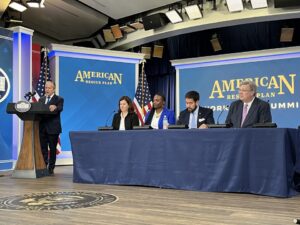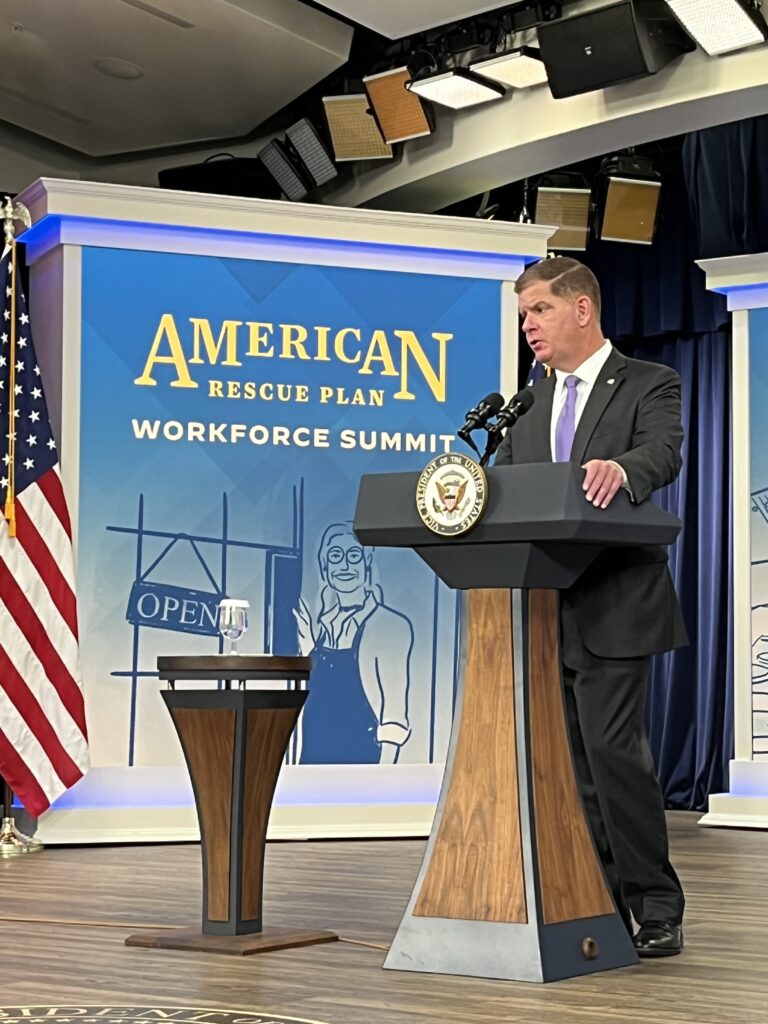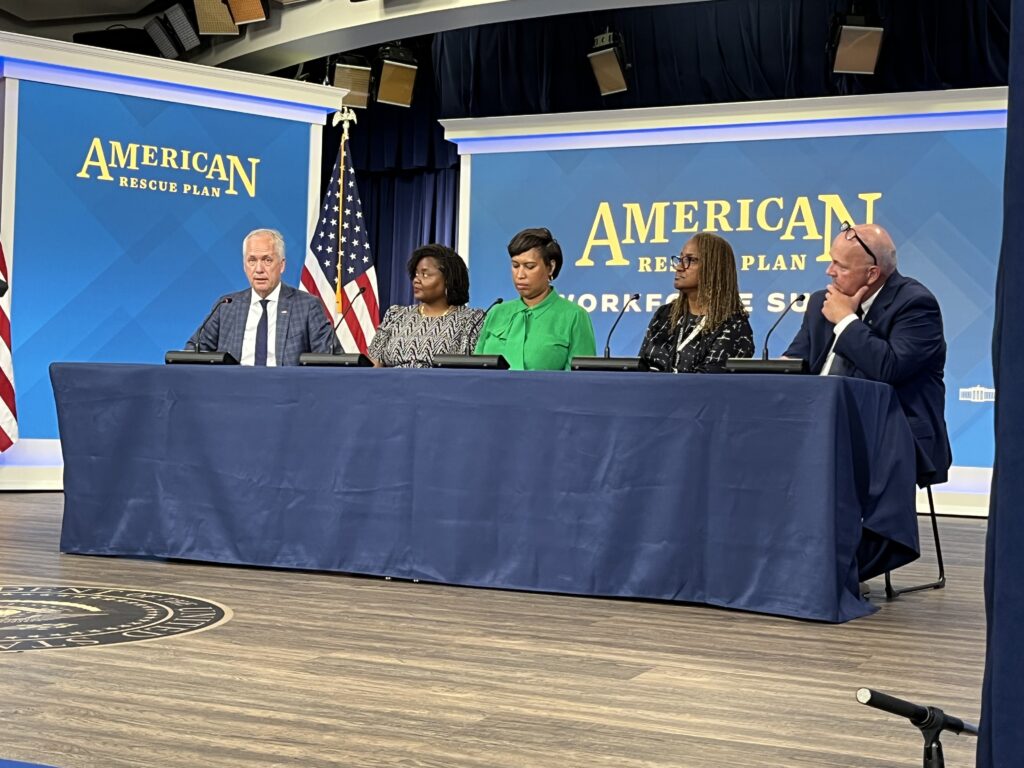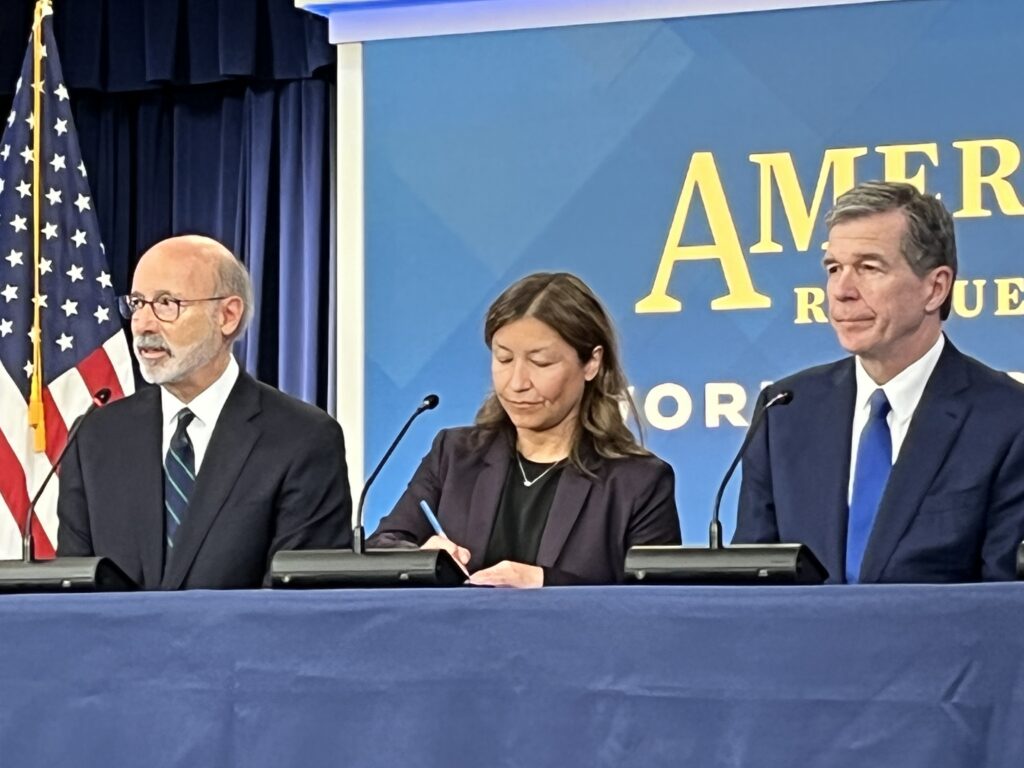On Wednesday, July 13th, the White House hosted an American Rescue Plan Workforce Summit to showcase states, localities and various stakeholders that have been using federal American Rescue Plan Act (ARPA) funds to train people for new skilled careers coming out of the pandemic. Headlined by Vice-President Kamala Harris (pictured in the top photo) and Labor Secretary Marty Walsh, and hosted by Gene Sperling, Senior Advisor to the President, the Summit marked the latest in a series of public events by the Biden-Harris Administration focused on the need for expanded workforce development strategies to bring more working people into the post-pandemic recovery and to meet the President’s goals around racial equity and inclusion.
A recording of the three-hour event can be viewed on YouTube.

Lindsay Blumer, President and CEO of WRTP | Big Step (left) and Chytania Brown, President and CEO of Employ Milwaukee (second from left).
National Skills Coalition CEO Andy Van Kleunen was in attendance along with a number of Governors, Mayors and Local Elected Officials, labor leaders and workforce development experts—including Lindsay Blumer, President and CEO of WRTP | Big Step and Chytania Brown, President and CEO of Employ Milwaukee (the city’s Workforce Development Board). Their joint effort to train Milwaukee residents for skilled careers in the building trades was specifically called out by the Vice-President in her opening remarks.
Andy caught up with Lindsay and Chytania after the event. You can read their interview on LinkedIn.

At the event, Vice-President Harris announced an estimated $40 billion of the $1.9 trillion appropriated under ARPA would be expended through 2024 on workforce development efforts in such areas as diversifying the infrastructure workforce, strengthening the healthcare workforce, and expanding access to skilled jobs for underserved Americans. Many of the models cited in the posted White House analysis attended the Summit in person to share their efforts.
Across all these local projects, best practices highlighted for years by NSC’s policy agenda were lifted up as model uses of ARPA funds, including
NSC would like to see more such models—and the wider adoption of such effective practices—incorporated not only into the broader expenditure of ARPA funds, but in how all workforce, higher education and support service programs are authorized and implemented into the future.

For the past two years NSC has been concerned that policymakers, in prioritizing how to spend available pandemic recovery resources, were not looking ahead and investing in the futures of those working people most impacted by the COVID recession. Many of those workers—people of color, women, lower-wage workers—were at risk of being left behind, and many of them still have not had the chance to share in recent economic growth. We’ve wanted to see those working people prioritized and given the chance to enter into skilled careers better than the jobs they held prior to the pandemic.
The Biden administration has clearly embraced that perspective, given its recent attention to the workforce development issues through this ARPA Workforce Summit, as well as the Talent Pipeline Challenge it recently issued to secure commitments from local employers, state/local officials, unions and industry partnerships to train and diversify the new infrastructure workforce. The model workforce training efforts shared that the ARPA Summit demonstrate that many states and localities have turned this corner as well.
However, we know from reports from NSC members that many states and locals are still sitting on a significant amount of unspent ARPA dollars, and have been hesitant to make the kind of forward-looking investments in people highlighted by this White House event. This not only puts the futures of many working Americans on hold. It threatens the future viability of the rollout of the Infrastructure Improvement and Jobs Act, which will be creating millions of jobs in sectors that already are reporting difficulties finding qualified workers for good-paying, skilled positions. To make sure the shovel-ready projects being designed for infrastructure investment next year with IIJA dollars will be able to immediately move forward, we need to be making sure our communities are worker-ready as well—which means investing now in skills and opportunity of our people.
NSC’s People-Powered Infrastructure Campaign will be actively working with the Biden White House and various agencies (Labor, Education, Commerce, Transportation, Energy) to make sure Washington is giving every available support to states and locals to design infrastructure projects with local people in mind. (Some of those recommendations can be viewed in the proposal issued by our Infrastructure Industry Recovery Panel last year.) And we will be working with our members and state affiliates around the country to push now for the expenditure of available resources—including those from the American Rescue Plan—in workforce training and career pathways for people who have in the past been denied a chance to be part of our country’s infrastructure workforce.
Stay tuned for future analyses from NSC about how its members can weigh in on these discussions both in Washington and at the state / local level. Our next Fireside Chat will also focus on these issues with a key leader in the Biden Administration’s infrastructure rollout.
